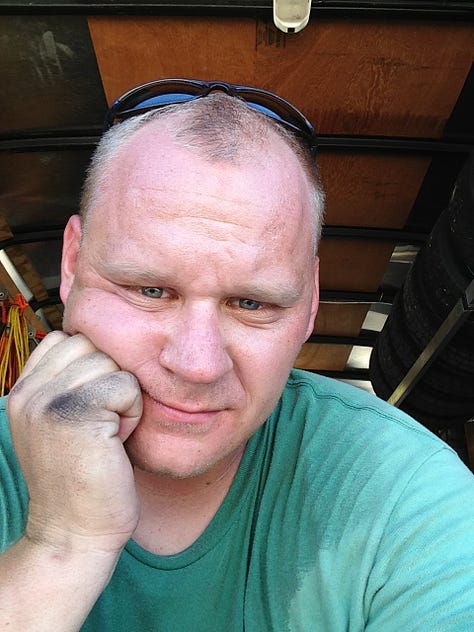Confidence Across Domains
"We are all in the gutter, but some of us are looking at the stars." -Oscar Wilde
I recently helped my wife craft an email for her business. The email wasn't a make-or-break situation and my role was minor, she just wanted a second set of eyes to suggest the right way to say a few things.
The note was clearly successful, because it resulted in coffee with a new connection and an expanded opportunity for her business. She was just as nervous about the coffee! Do I arrive early? Do I buy for both of us? Should I project salesman-like confidence or have a conversation among equals?
I was utterly fascinated by this for a few reasons. My wife had started her own business from scratch — there ought to be a default minimum of confidence for someone who already went from zero to one. Beyond that, she'd had a long and successful nursing career. She'd been successful in multiple fields! And aside from all that — and I say this with acute awareness of my own fundamental bias — she is both personable and very attractive... to the point where I've seen her make new people nervous many times.
So why was she nervous doing a simple intro coffee?
I found the answer in all of my own shortcomings. Because I can relate.
In my day job, I'm the CEO of a not-very-small company. I was employee number 2 and now there are nearly 300 of us. I regularly interact with all sorts of other people in my industry. I have no problem reading these interactions, managing the proper amount of information exchange, and using whatever "gusto" I have to build connections. In short, I feel confident. I'm not nervous to meet people in my industry because I am knowledgeable and have a ton of experience and I know that others share this confidence.
In this very narrow domain, I feel strong. But in plenty of other parts of my life — and some of them are as simple as my son's soccer team or my daughter's HSA or my extended social network — I still feel small and meek.
At some point in the course of our business talk, she reminded me that people are sometimes super intimidated to meet me. Because I'm the CEO, or the lead engineer, or — in a past life — a car racing instructor. Really it doesn't matter the title or skill, what matters is that at a certain level, success creates a persona to others. It feels strange to realize I have one of those, because I'm just a guy. I feel confident in certain domains but that doesn't confer anything special.
I don't mean this to sound self-deprecating. What I mean is that what feels like simple confidence to each of us is often perceived as status to others.
What we need to be able to do is transfer our confidence across domains. We as humans are able to quickly recognize talent. We define quantifiable measures in everything from solving Rubik’s cubes to daytrading to managing clients. What we lack is a common way to move these confidences between fields. There's no confidence equivalent between crypto trading and competitive swing dancing.
But there ought to be.
Because mastery begets future success. A kid who can lose herself for hours solving Rubik’s cubes doesn't just master algorithms - she masters the art of breaking down complex systems. The teenager obsessing over Pokemon stats is learning pattern recognition that could reshape markets years later. A young Jeff Bezos rewired his grandmother's house and turned his parents' garage into a science lab before he reinvented retail.
If someone can master a domain, no matter how seemingly trivial, they're developing the muscle for mastering anything else. Not because solving a cube is like building a business — it's not — but because the focused obsession, the systematic thinking, the pure drive to understand... these are the seeds of future success.
My wife didn't need my advice on how to present herself, she's fabulous at it. I needed to remind her that the same presence that commanded an emergency room doesn't vanish in a coffee shop. She needed permission to be as confident in a business meeting as she was in an emergency C-section. Sometimes we just need someone else to tell us that we're not starting from zero — we're building on foundations we've already laid.
We tell ourselves that our expertise exists in silos. That somehow the grit it took to master programming or Rubiks cubes or nursing doesn't translate elsewhere — that's nonsense. Once a mind can master a complex system, it can master another. Not because the skills are identical (they're not) but because the muscle of mastery, once developed, doesn't forget its strength.
This sort of confidence is a learned skill, and like any other learned skill it takes practice. My job — our job — is to remember the mastery we have and use that as a tool to transfer confidence from one domain to another.
We don’t need to learn confidence twice. We just need to keep it, remember it, once we’ve earned it through our toil and trials.






